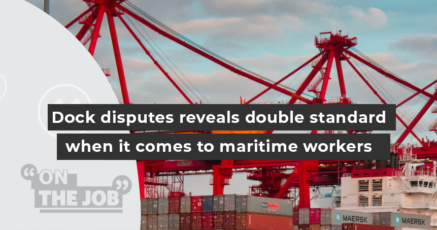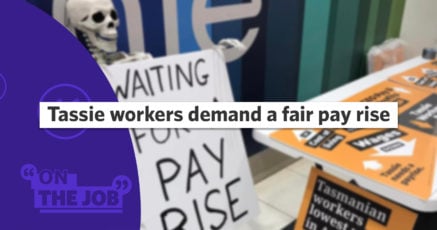Workers in Australia’s beleaguered aged care sector are some of the most resilient people you will ever meet, but even they have their tipping point.
After years of Liberal Party neglect and standing alone against the ravages of the COVID-19 pandemic, aged care workers are overworked, under-paid, and ready to take action.
Aged care workers across Australia have voted to take industrial action over massive staff shortages and the low rates of pay that characterise an industry with an acute workforce crisis and a Morrison Government missing in action when needed most.
United Workers Union Aged Care Director Carolyn Smith told On the Job how aged care workers had been going years without recognition for their difficult and incredible work.
“They’ve really had enough,” Smith said.
“We had an aged care Royal Commission announced in 2018 and aged care workers participated in the Royal Commission hoping that they would be recognised.”
The Royal Commission put out a report that really reinforced what aged care workers know, which is the sector is grossly understaffed, and workers are underpaid. But unfortunately, we’ve seen no action on staffing or pay from this current federal government.
Carolyn Smith
United Workers Union Aged Care Director

The last resort to address a workforce crisis
The UWU said around 7000 members at five aged care facilities across Queensland, South Australia and Western Australia (where the Union has coverage in aged care) have overwhelmingly voted for industrial action to address the aged care workforce crisis.
Most of the ballots held to determine whether to proceed with industrial action clicked over 90% support, indicating the depth of feeling amongst aged care staff.
Smith is unsurprised by the depth of sentiment amongst workers.
“Workers have been on the front lines through the pandemic,” she said.
“Just in 2022, we’ve had over 800 deaths in residential aged care. The sector is already understaffed and then COVID, and particularly Omicron, has just intensified that with people off sick or people isolating.”
“We see places running with half their normal staff,” Smith says.
Given the depth of commitment workers have for residents, industrial action is a last resort. It is likely to include strike action, cessation of administrative paperwork, and curtailing dialogue with residents’ families and the media.
Smith is adamant about the urgency aged care workers feel in addressing the workforce crisis.
“The deaths have been really gruelling but just the day-to-day work in the sector is really gruelling. Workers feel they are basically the only thing standing between the residents and collapse of the system.”
“Workers tell me stories of having 10 minutes to shower a frail elderly residentswith dementia and when you’re rushing that person, you can’t give them the dignity and the respect that they deserve.”
“Maybe that day you won’t actually have time to shower that person.”
“Every day aged care workers are saying ‘no’ to residents. Residents are saying, ‘Can you stay? Can you talk to me, I’m really lonely. My family can’t visit.’ And they’re just having to say – ‘no I’ve got five more residents to get out of bed. And I’ve got 10 people to take to breakfast.'”
Morrison missing in action on wage increases
The ballot to support industrial action comes as the Fair Work Commission begins hearing a claim in support of a 25% pay rise workers from the UWU as well as the Health Services Union and the Australian Nursing and Midwifery Federation.
Morrison could support the wage claim – but despite the findings of the Royal Commission that identified a significant wage rise as central to any meaningful reform in the sector – the Prime Minister has again gone missing.
Smith sees the campaign as a values test for our politicians and Australian society.
“It says something pretty sad about our community that you can change a submarine contract, and that’s going to cost us $5 billion, and no one seems to mind,” she says.
“When people start to talk about having more staff in aged care, or registered nurses in aged care, or improving the wages, people say, ‘Oh, well, that’s going to cost a lot of money.’”
“This is absolutely about our priorities as a country. Older Australians are the ones who built this country who came before us and who made life a little bit easier for us. We should be making life a bit easier for them.”








SHARE:
Aged care workers ready to save the sector through industrial action